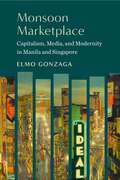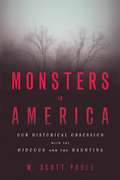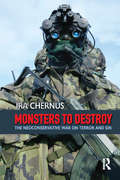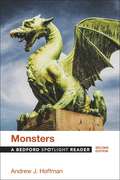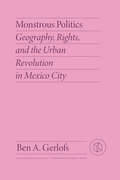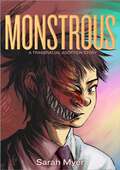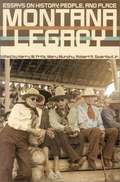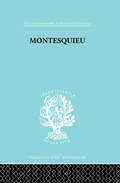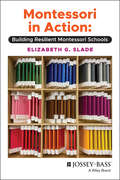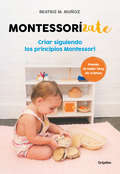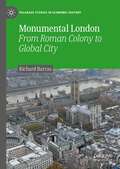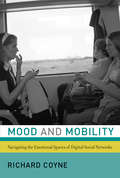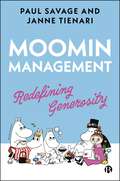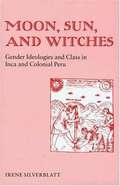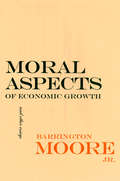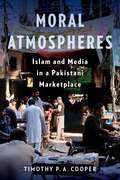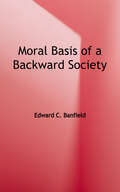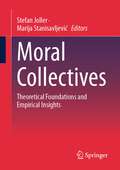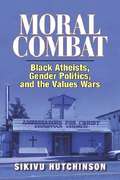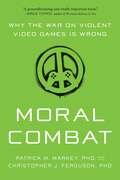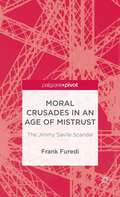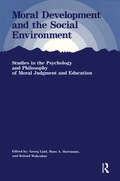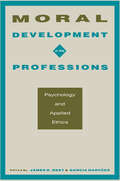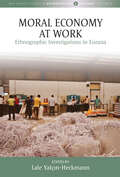- Table View
- List View
Monsoon Marketplace: Capitalism, Media, and Modernity in Manila and Singapore
by Elmo GonzagaProvides vivid accounts of commercial and leisure spaces that captivated the public imagination in the past but have since been destroyed, forgotten, or refurbished.Monsoon Marketplace uncovers the entangled vernacular cultures of capitalist modernity, mass consumption, and media spectatorship in two understudied postcolonial Asian cities across three crucial historical moments. Juxtaposing Manila and Singapore, it analyzes print and audiovisual representations of popular commercial and leisure spaces during the colonial occupation in the 1930s, national development in the 1960s, and neoliberal globalization in the 2000s. Engaging with the work of creators including Nick Joaquin, Kevin Kwan, and P. Ramlee, it discusses figures of female shoppers in 1930s Manila, languid expatriates in 1930s Singapore, street hawkers in 1960s Singapore, youthful activists in 1960s Manila, call center agents in 2000s Manila, and super-rich investors in 2000s Singapore. Looking at the historical transformation of Calle Escolta, Avenida Rizal, Raffles Place, and Orchard Road, it focuses on Crystal Arcade, the Manila Carnival, the Great World and New World Amusement Parks, and Change Alley, all of which had once captivated the public imagination but have since vanished from the cityscape. Instead of treating capitalism, media, and modernity as overarching systems or processes, the book examines how their configurations and experiences are contingent, variable, pluralistic, and archipelagic. Diverging from critical theories and cultural studies that see consumerism and spectatorship as sources of alienation, docility, and fantasy, it explores how they create new possibilities for agency, collectivity, and resistance.
Monsters in America: Our Historical Obsession with the Hideous and the Haunting
by W. Scott Poole<p>Salem witches, frontier wilderness beasts, freak show oddities, alien invasions, Freddie Krueger. From our colonial past to the present, the monster in all its various forms has been a staple of American culture. A masterful survey of our grim and often disturbing past, Monsters in America uniquely brings together history and culture studies to expose the dark obsessions that have helped create our national identity. <p>Monsters are not just fears of the individual psyche, historian Scott Poole explains, but are concoctions of the public imagination, reactions to cultural influences, social change, and historical events. Conflicting anxieties about race, class, gender, sexuality, religious beliefs, science, and politics manifest as haunting beings among the populace. From Victorian-era mad scientists to modern-day serial killers, new monsters appear as American society evolves, paralleling fluctuating challenges to the cultural status quo. Consulting newspaper accounts, archival materials, personal papers, comic books, films, and oral histories, Poole adroitly illustrates how the creation of the monstrous "other" not only reflects society's fears but shapes actual historical behavior and becomes a cultural reminder of inhuman acts.</p>
Monsters to Destroy: The Neoconservative War on Terror and Sin
by Ira Chernus"This book takes an incisive look at the stories we are told -- and tell ourselves -- about evil forces and American responses. Chernus pushes beyond political rhetoric and media cliches to examine psychological mechanisms that freeze our concepts of the world." Norman Solomon, author, War Made Easy: How Presidents and Pundits Keep Spinning Us to Death In his new book Monsters to Destroy: The Neoconservative War on Terror and Sin, Ira Chernus tackles the question of why U.S. foreign policy, aimed at building national security, has the paradoxical effect of making the country less safe and secure. His answer: The "war on terror" is based not on realistic appraisals of the causes of conflict, but rather on "stories" that neoconservative policymakers tell about human nature and a world divided between absolute good and absolute evil. The root of the stories is these policymakers' terror of the social and cultural changes that swept through U.S. society in the 1960s. George W. Bush and the neoconservatives cast the agents of change not simply as political opponents, but as enemies or sinners acting with evil intent to destroy U.S. values and morals-that is, as "monsters" rather than human beings. The war on terror transfers that plot from a domestic to a foreign stage, making it more appealing even to those who reject the neoconservative agenda at home. Because it does not deal with the real causes of global conflict, it harms rather than helps the goal of greater national security.
Monsters: A Bedford Spotlight Reader
by Andrew J. HoffmanMonsters explores questions about the central concept of the monstrous: Why do we create monsters? Are they animal, human, both, or neither? Which of our fears and desires do monsters embody? What can monsters tell us about our cultural and historical moments? How do we cope with the monsters that haunt our imaginations--and our societies? Readings by classic poets, contemporary fiction writers, pop culture critics, philosophers, psychologists, occultists, veterinarians, ethicists, historians, and others take up these questions and more. Questions and assignments for each selection provide a range of activities for students to write about vampires, werewolves, zombies, mermaids, serial killers, classic horror movie monsters, and more strange things that go bump in the night. The Bedford Spotlight Reader Series is an exciting line of single-theme readers, each reflecting Bedford's trademark care and quality. An editorial board of a dozen compositionists at schools with courses focusing on specific themes assists in the development of the series. Each reader collects thoughtfully chosen selections sufficient for an entire writing course--about 35 pieces--to allow instructors to provide carefully developed, high-quality instruction at an affordable price. Bedford Spotlight Readers are designed to help students from all majors make sustained inquiries from multiple perspectives, opening up topics such as borders, food, gender, happiness, humor, language, music, science and technology, subcultures, and sustainability, to critical analysis. The readers are flexibly arranged in thematic chapters, with each chapter focusing in depth on a different facet of the central topic. Instructor support at macmillanlearning.com includes sample syllabi and additional teaching resources.
Monstrous Politics: Geography, Rights, and the Urban Revolution in Mexico City (Critical Mexican Studies)
by Ben GerlofsThe birth of the world&’s great megacities is the surest and starkest harbinger of the &“urban age&” inaugurated in the twentieth century. As the world&’s urban population achieves majority for the first time in recorded history, theories proliferate on the nature of urban politics, including the shape and quality of urban democracy, the role of urban social and political movements, and the prospects for progressive and emancipatory change from the corridors of powerful states to the routinized rhythms of everyday life. At stake are both the ways in which the rapidly changing urban world is understood and the urban futures being negotiated by the governments and populations struggling to contend with these changes and forge a place in contemporary cities.Transdisciplinary by design, Monstrous Politics first moves historically through Mexico City&’s turbulent twentieth century, driven centrally by the contentious imbrication of the Institutional Revolutionary Party (PRI) and its capital city. Participant observation, expert interviews, and archival materials demonstrate the shifting strategies and alliances of recent decades, provide the reader with a sense of the texture of contemporary political life in the city during a time of unprecedented change, and locate these dynamics within the history and geography of twentieth-century urbanization and political revolution. Substantive ethnographic chapters trace the emergence and decline of the political language of &“the right to the city,&” the establishment and contestation of a &“postpolitical&” governance regime, and the culmination of a century of urban politics in the processes of &“political reform&” by which Mexico City finally wrested back significant political autonomy and local democracy from the federal state.A four-fold transection of the revolutionary structure of feeling that pervades the city in this historic moment illustrates the complex and contradictory sentiments, appraisals, and motivations through which contemporary politics are understood and enacted. Drawing on theories of social revolution that embrace complexity, and espousing a methodology that foregrounds the everyday nature of politics, Monstrous Politics develops an understanding of revolutionary urban politics at once contextually nuanced and conceptually expansive, and thus better able to address the realities of politics in the &“urban age&” even beyond Mexico City.
Monstrous: A Transracial Adoption Story
by Sarah MyerA poignant young adult graphic memoir about a Korean-American girl who uses fandom and art-making to overcome racist bullying. Perfect for fans of American Born Chinese and Almost American Girl!Sarah has always struggled to fit in. Born in South Korea and adopted at birth by a white couple, she grows up in a rural community with few Asian neighbors. People whisper in the supermarket. Classmates bully her. She has trouble containing her anger in these moments—but through it all, she has her art. She's always been a compulsive drawer, and when she discovers anime, her hobby becomes an obsession.Though drawing and cosplay offer her an escape, she still struggles to connect with others. And in high school, the bullies are louder and meaner. Sarah's bubbling rage is threatening to burst.
Montana Legacy: Essays on History, People, and Place
by Mary Murphy Harry W. Fritz Robert SwartoutWe selected recently published essays for inclusion, ones that reflect current interpretations and approaches
Montesquieu: Pioneer of the Sociology of Knowledge (International Library of Sociology)
by Werner StarkFirst published in 1998. Routledge is an imprint of Taylor & Francis, an informa company.
Montesquieu: The Spirit of the Laws
by Anne M. Cohler Basia Carolyn Miller Harold Samuel Stone Charles De MontesquieuThe Spirit of the Laws is without question one of the central texts in the history of eighteenth-century thought, yet there has been no complete scholarly English language edition since 1750. This lucid translation renders Montesquieu's problematic text newly accessible to a fresh generation of students, helping them to understand why Montesquieu was such an important figure in the early enlightenment and why The Spirit of the Laws was such an influence on those who framed the American Constitution. Fully annotated, this edition focuses on Montesquieu's use of sources and his text as a whole, rather than on those opening passages toward which critical energies have traditionally been devoted.
Montessori in Action: Building Resilient Montessori Schools
by Elizabeth G. SladeJoin the Revolution! Build a resilient Montessori school Montessori in Action: Building Resilient Montessori Schools delivers a practical and actionable method to provide a strong Montessori experience for all children, families and educators. The first of its kind, this book offers readers a collection of modern and concrete ways to build an equitable and resilient Montessori program, by discussing topics like: Working within the unique, complex ecosystem of Montessori to build a unified community empowered to serve the mission of the school Sharing ways to create a culture of honest conversation based on the values of growth and clarity Offering ways to build strong and resilient systems that will engage the whole community and yield results Perfect for Montessori educators and administrators of all kinds, Montessori in Action will support educators in taking action! This book provides structures, tools and timetables to strengthen and improve schools. It will also earn a place in the libraries of the parents of Montessori children who desire to create and maintain an equitable environment that benefits all students, regardless of their background.
Montessorízate: Criar siguiendo los principios Montessori
by Beatriz M. MuñozNos empeñamos en educar a nuestros hijos de la mejor manera posible, pero ¿y si fueran ellos quienes nos tienen que enseñar a nosotros? <P><P>Montessorízate es la guía definitiva para aplicar el método Montessori en casa. Después de su exitoso blog tigriteando.com, Beatriz M. Muñoz nos trae un libro repleto de consejos para adaptar el método Montessori al día a día en el hogar y empezar una pequeña revolución educativa en casa. <P> Con este nuevo enfoque, nuestros hijos se acostumbrarán a ser más autónomos y responsables. Este libro ofrece ideas y consejos que nos ayudarán a: <br>- Entender el comportamiento y las reacciones de nuestros hijos. <br>- Preparar el hogar para que nuestros hijos puedan desarrollarse con autonomía. <br>- Aprovechar cada día para aprender de los más pequeños de la casa. <P>Beatriz M. Muñoz pretende ayudar a todos los padres que prefieren que sus hijos aprendan a descubrir el mundo y a tomar decisiones por ellos mismos, pero que no saben por dónde empezar. En este libro nos acercaremos de forma sencilla y amena al método Montessori para incorporarlo poco a poco en nuestro hogar.
Monumental London: From Roman Colony to Global City (Palgrave Studies in Economic History)
by Richard BarrasThis book presents an original interpretation of the building history of London in terms of its evolving political economy. Each of the seven ages of the city from the Roman to the modern, are portrayed through their monumental buildings, concentrating in particular on their symbolic purpose as expressions of the status and authority of those who built them. The concluding synthesis explores how these successive layers of building can be seen to be a product of the evolving class structure, the changing distribution of wealth, and the shifting struggle for political power within the city and the nation. Although the focus is on London, the analysis is applicable to any urbanized economy at any stage of development. This book offers unique insight into London as a landscape of power and as a city that has assumed a succession of identities over the last two millennia. It will be relevant to students and researchers interested in urban economy, economic history, and the political economy.
Mood and Mobility: Navigating the Emotional Spaces of Digital Social Networks
by Richard CoyneAn argument that as we engage with social media on our digital devices we receive, modify, intensify, and transmit moods.We are active with our mobile devices; we play games, watch films, listen to music, check social media, and tap screens and keyboards while we are on the move. In Mood and Mobility, Richard Coyne argues that not only do we communicate, process information, and entertain ourselves through devices and social media; we also receive, modify, intensify, and transmit moods. Designers, practitioners, educators, researchers, and users should pay more attention to the moods created around our smartphones, tablets, and laptops.Drawing on research from a range of disciplines, including experimental psychology, phenomenology, cultural theory, and architecture, Coyne shows that users of social media are not simply passive receivers of moods; they are complicit in making moods. Devoting each chapter to a particular mood—from curiosity and pleasure to anxiety and melancholy—Coyne shows that devices and technologies do affect people's moods, although not always directly. He shows that mood effects are transitional; different moods suit different occasions, and derive character from emotional shifts. Furthermore, moods are active; we enlist all the resources of human sociability to create moods. And finally, the discourse about mood is deeply reflexive; in a kind of meta-moodiness, we talk about our moods and have feelings about them. Mood, in Coyne's distinctive telling, provides a new way to look at the ever-changing world of ubiquitous digital technologies.
Moomin Management: Redefining Generosity
by Janne Tienari Paul SavageMoomins, beloved troll creatures of Moominvalley, have captivated hearts worldwide since the 1940s. This book unveils the Moomin business management journey, from Tove Jansson's creations to a global art-based brand and a growing ecosystem of companies. Emphasising generosity as a key management principle, it champions caring for people as vital for a thriving organisation. Generosity, rooted in love, courage and belief in equality, shapes the Moomin ethos, underpinning not just the brand, but also strategic partnerships, engagement with technologies and the virtual world. Offering rare insights from the Moomin inner circle, this management guide advocates sustainable practices. It unveils the keys to a business devoted to comforting people and fostering good, inspiring a blueprint for lasting success.
Moon, Sun, And Witches: Gender Ideologies and Class in Inca and Colonial Peru
by Irene SilverblattState formation and gender hierarchy have been analyzed in this book with examples from real life situations.
Moral Aspects of Economic Growth, and Other Essays (The Wilder House Series in Politics, History and Culture)
by Barrington Moore Jr.Barrington Moore, Jr., one of the most distinguished thinkers in critical theory and historical sociology, was long concerned with the prospects for freedom and decency in industrial society. The product of decades of reflection on issues of authority, inequality, and injustice, this volume analyzes fluctuating moral beliefs and behavior in political and economic affairs at different points in history, from the early Middle Ages in England to the prospects for liberalism under twentieth-century Soviet socialism. The social sources of antisocial behavior; principles of social inequality; and the origins, enemies, and possibilities of rational discussion in public affairs—these are among the topics Moore considers as he seeks to uncover the historical causes of some accepted forms of morality and to assess their social consequences.The keynote essay examines how moral codes grew out of commercial practices in England from medieval times through the industrial revolution. Moore pays special attention to conceptions of honesty and the temptation to evade that inform the volume as a whole. In the other essays, he considers particular political issues, viewing "political" in its broadest sense as an unequal distribution of power and authority that carries a strong moral charge. Free of preaching and advocacy, his work offers a rare reasonable assessment of the morality of major social institutions over time.
Moral Atmospheres: Islam and Media in a Pakistani Marketplace (Religion, Culture, and Public Life #51)
by Timothy P. CooperLahore’s Hall Road is the largest electronics market in Pakistan. Once the center of film and media piracy in South Asia, it now specializes in smartphones and accessories. For Hall Road’s traders, conflicts between the economic promises and the moral dangers of film loom large. To reconcile their secular trade with their responsibilities as devoted Muslims, they often look to adjudicate the good or bad moral “atmosphere” (mahaul) that can cling to film and media.Timothy P. A. Cooper examines the diverse and coexisting moral atmospheres that surround media in Pakistan, tracing public understandings of ethical life and showing how they influence economic behavior. Drawing on extensive ethnographic work among traders, consumers, collectors, archivists, cinephiles, and cinephobes, Moral Atmospheres explores varied views on what the relationship between film and faith should look, sound, and feel like for Pakistan’s Muslim-majority public. Cooper considers the preservation and censorship of film in and outside of the state bureaucracy, contestations surrounding heritage and urban infrastructure, and the production and circulation of sound and video recordings among the country’s religious minorities. He argues that a focus on atmosphere provides ways of seeing moral thresholds as mutable and affective, rather than as fixed ethical standpoints. At once a vivid ethnography of a market street and a generative theorization of atmosphere, this book offers fresh perspectives on moral experience and the relationship between religion and media.
Moral Basis of a Backward Society
by Edward C. BanfieldLooking at how nepotism and family-centric societies sacrifice the public good, Edward C. Banfield uses a study of the people of southern Italy to argue how self-interested families can lead to poverty. Analyzing families in southern Italy in 1955, Moral Basis of a Backward Society discusses how poverty is a result of the inability to trust or associate strongly outside of immediate family. Challenged and argued for years, Edward C. Banfield's study has become accept by many people in the modern age.
Moral Collectives: Theoretical Foundations and Empirical Insights
by Stefan Joller Marija StanisavljevićWhether terrorist attacks, refugee or financial crises - the challenges of globalized modernity expose those areas that Durkheim described as anomic and whose processing still illustrates the central position of moral communication. There is some evidence to suggest that progressive functional differentiation does not erode morality, but actually promotes a remoralization of society through increasing communicative networking. Wherever grievances come to light and it is not foreseeable how they could be satisfactorily resolved in the modus operandi, morality provides a promising instrument which, in the form of moral collectives, is able to permeate everyday life and shape society. In this sense, the anthology is dedicated to a theoretical as well as empirical analysis of morality, which takes shape as a genuinely social quantity via moral collectives. This book is a translation of an original German edition. The translation was done with the help of artificial intelligence (machine translation by the service DeepL.com). A subsequent human revision was done primarily in terms of content, so that the book will read stylistically differently from a conventional translation.
Moral Combat: Black Atheists, Gender Politics, and the Values Wars
by Sikivu HutchinsonThe word atheism elicits shock, dread, anger, and revulsion among most African Americans. They view atheism as “amoral,” heresy, and race betrayal. Historically, the Black Church was a leading force in the fight for racial justice. Today, many black religious leaders have aligned themselves with the Religious Right. While black communities suffer economically, the Black Church is socially conservative on women’s rights, abortion, same sex marriage, and church/state separation. These religious “values wars” have further solidified institutional sexism and homophobia in black communities. Yet, drawing on a rich tradition of African American free thought, a growing number of progressive African American non-believers are openly questioning black religious and social orthodoxies. Moral Combat provides a provocative analysis of the political and religious battle for America’s soul. It examines the hijacking of civil rights by Christian fascism; the humanist imperative of feminism and social justice; the connection between K-12 education and humanism; and the insidious backlash of Tea Party-style religious fundamentalism against progressive social welfare public policy. Moral Combat also reveals how atheists of color are challenging the whiteness of “New Atheism” and its singular emphasis on science at the expense of social and economic justice. In Moral Combat, Sikivu Hutchinson highlights the cultural influence of African American humanist and atheist social thought in America. She places this tradition within the broader context of public morality and offers a far-reaching vision for critically conscious humanism
Moral Combat: Why the War on Violent Video Games Is Wrong
by Christopher J. Ferguson Patrick M. MarkeyIn family rooms across America, millions of children and teenagers are playing video games, such as Call of Duty, Halo, and Grand Theft Auto, roaming violent virtual worlds—with virtual guns in their hands. In what sometimes seems like an increasingly violent world, it's only natural to worry about the effects of all this pixelated gore. But is that concern misplaced? Authors and psychologists Patrick M. Markey and Christopher J. Ferguson say it is. The media and politicians have been sounding the alarm for years, and with every fresh tragedy involving a young perpetrator comes another flurry of articles about the dangers of violent media. The problem is this: Their fear isn't supported by the evidence. In fact, unlike the video game–trained murder machines depicted in the press, school shooters are actually less likely to be interested in violent games than their peers. In reality, most well-adjusted children and teenagers play violent video games, all without ever exhibiting violent behavior in real life. What's more, spikes in sales of violent games actually correspond to decreased rates of violent crime. If that surprises you, you're not alone—the national dialogue on games and violence has been hopelessly biased. But that's beginning to change. Scholars are finding that not only are violent games not one of society's great evils, they may even be a force for good. In Moral Combat, Markey and Ferguson explore how video games—even the bloodiest—can have a positive impact on everything from social skills to stress, and may even make us more morally sensitive. Tracing the rise of violent games from arcades to online deathmatches, they have spent years on the front lines of the video game debate and now offer a comprehensive overview of the scientific research on gaming. With humor, complete honesty, and extensive research, they separate the myth from the medium. Moral Combat is an irreverent and informative guide to the worries—and wonders—of our violent virtual world.
Moral Crusades in an Age of Mistrust: The Jimmy Savile Scandal
by Frank FurediThe epidemic of scandals unleashed by the Savile Scandal highlights the precarious status of relations of trust. The rapid escalation of this crisis offers insights into the relationship between anxieties about childhood and the wider moral order. This book explains why western society has become so uncomfortable with the exercise of authority.
Moral Development and the Social Environment
by Georg LindThe chapters in this volume are about moral dilemmas in two senses. First the authors focus on dilemmas, both real and hypothetical, which require moral judgements. The 'Heinz-Dilemma' part of Kohlberg's scoring systems is used as a point for level of moral development. There is also a Second sense, as those who study moral reasoning being in a dilemma as they attempt to integrate information from the domains of philosophy and psychology.
Moral Development in the Professions: Psychology and Applied Ethics
by James R. Rest Darcia Narv Nbsp EzEvery year in this country, some 10,000 college and university courses are taught in applied ethics. And many professional organizations now have their own codes of ethics. Yet social science has had little impact upon applied ethics. This book promises to change that trend by illustrating how social science can make a contribution to applied ethics. The text reports psychological studies relevant to applied ethics for many professionals, including accountants, college students and teachers, counselors, dentists, doctors, journalists, nurses, school teachers, athletes, and veterinarians. Each chapter begins with the research base of the cognitive-developmental approach--especially linked to Kohlberg and Rest's Defining Issues Test. Finally, the book summarizes recent research on the following issues: * moral judgment scores within and between professions, * pre- and post-test evaluations of ethics education programs, * moral judgment and moral behavior, * models of professional ethics education, and * models for developing new assessment tools. Researchers in different professional fields investigate different questions, develop different research strategies, and report different findings. Typically researchers of one professional field are not aware of research in other fields. An important aim of the present book is to bring this diverse research together so that cross-fertilization can occur and ideas from one field can transfer to another.
Moral Economy at Work: Ethnographic Investigations in Eurasia (Max Planck Studies in Anthropology and Economy #8)
by Lale Yalçın-HeckmannThe idea of a moral economy has been explored and assessed in numerous disciplines. The anthropological studies in this volume provide a new perspective to this idea by showing how the relations of workers, employees and employers, and of firms, families and households are interwoven with local notions of moralities. From concepts of individual autonomy, kinship obligations, to ways of expressing mutuality or creativity, moral values exert an unrealized influence, and these often produce more consent than resistance or outrage.
